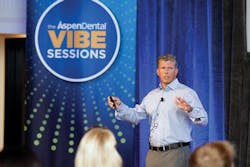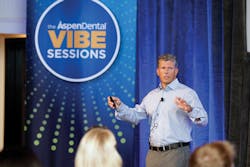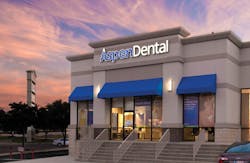15,000 patients a day: Exclusive interview with Bob Fontana, CEO of Aspen Dental Management Inc.
It's difficult to wrap your mind around the success Aspen Dental has experienced in the past five years. Today, there are nearly 550 affiliated practices, with a new practice being added, on average, every six days. That awesome growth provides Aspen Dental the opportunity to shape the future of dental practice in America—so how will it? As the leader of one of the most visible DSOs in the country, Bob Fontana is in the dead center of the "corporate dentistry" debate. we interviewed Fontana about the success of Aspen Dental, the ethical obligations of DSOs, and whether "corporate dentistry" is a good thing for patients, dentists, and American health care. Here is his unique perspective.
Part I: The growth of ADMI and Aspen Dental
Mr. Fontana, how did you come to the dental business?
The early part of my career was spent as an office manager, working for a dentist in New England. For a time, I actually considered going to dental school myself.
When did you realize the growth potential for ADMI (Aspen Dental Management Inc.)?
I realized the potential for growth pretty early on. I looked at the success of businesses like LensCrafters-one of the first truly consumer-centric models in health care. It was reshaping the eye care industry and doing something that no one else was doing. I wondered whether we, as a dental support organization (DSO), could do something similar: supporting practices that provide value and benefits to patients while operating under a common brand.
While DSOs weren't necessarily new when ADMI was founded, I believed that there was a pretty clear opportunity to innovate within the dental industry. Over the past two decades, we've been able to do just that. Today there are nearly 550 independently owned Aspen Dental practices in 33 states, and we're adding an office every five or six days.
The growth trend of Aspen Dental is astonishing. As you say, there are nearly 550 affiliated practices today. But only three years ago there were "just" 300. That rate of growth seems much more rapid than other DSO-affiliated practices in the market. What are Aspen Dental offices doing differently that explains this growth?
It's hard to comment on how our growth strategy differs from that of other DSOs, but I'm a firm believer that market forces always prevail, and they are reshaping health care as we know it.
Our strategy has always been about trying to find a different way of doing things-a better way that is consistent with what we believe consumers want. When I say "consumers," I mean both patients and dentists. Our focus has always been on those two key stakeholder groups. We've wanted to break down barriers and create opportunities for patients to pick up the phone and call ADMI-supported practices, as well as for doctors to raise their hands and say, "Yes, this is a brand I believe in and an organization I want to be affiliated with."
ADMI CEO Bob Fontana
I read a story in the New York Times a couple of years ago that quoted Dr. Ateev Mehrotra at the RAND Corporation as having said, "We expect to do our banking 24 hours a day, seven days a week, and to shop 24/7. So now we want our health care to be 24/7."
The delivery of health care is changing because consumers are demanding it. Just think about the proliferation of urgent care centers, which are popping up on every corner, or health clinics within traditional retailers like CVS or Walmart. This rise in consumerism means that patient-centric models like ours are better positioned for long-term growth and success than traditional delivery models.
Let's face it. Dentistry has traditionally been an industry full of "no" and "can't."
The reason we have been able to grow and be successful is because we understand the changes that are happening and what consumers want from their health care. The Aspen Dental brand has always been about doing things differently, and we at ADMI have partnered with doctors who believe in a patient model that is built to break down barriers and make it easier for patients to be able to get the care they need.
What about the dentists joining these practices? What makes ADMI different from other DSOs?
At ADMI, we look at dentists much in the same way that the dentists we support look at patients: Dentists are our consumers.
Our mission at ADMI is to care for the people who care for the patients, so we've worked hard to build a model that puts dentists' wants and needs at the heart of everything we do. On a daily basis, that means supporting Aspen Dental practices with best-in-class business support that is essential to building a successful practice, which in turn allows dentists to focus on caring for their patients and building their clinical teams.
But what really differentiates us is our culture. When I get together with a group of Aspen Dental practice owners, I'm always so proud to see the community and camaraderie that exists between them. They collaborate with one another. They consult with one another about tough cases. They mentor one another. They support one another. And they enjoy one another immensely. It's incredible to see and almost impossible to put into words.
Part II: Growing pains
Growth brings opportunities and challenges. Describe some of the growing pains ADMI has had, and how you've addressed them.
Dental support organizations have been around for decades, yet there continues to be a lot of misinformation and misunderstanding of the model itself, even within the dental community. It's a challenge we share with other DSOs, but because the practices we support share a common brand, we are probably the most visible.
That means that we devote a lot of time trying to overcome misperceptions, clarifying that all Aspen Dental practices are independently dentist-owned and operated and that dentists have 100% clinical autonomy.
What's interesting is that the criticism we're seeing today is not without precedent. Health care underwent similar changes during the 1980s when LensCrafters revolutionized the eye care industry by offering consumers something that wasn't being offered anywhere else: retail locations that offered custom-crafted eyeglasses in about an hour with a money-back guarantee. That caused a lot of pushback within the ophthalmology community involving concerns about clinical autonomy and patient care.
Today we're on the other side of that debate, and eye care is probably one of the most successful sectors of health care. It has lower costs, better access, and more choices for consumers, and we're starting to see it more broadly across the health-care industry as a whole. That kind of innovation is reshaping dentistry, too, and we believe we're leading the change in dentistry.
One of the alleged difficulties DSO-affiliated dentists face is a pressure to place business goals, or profit, ahead of patient needs. Since Aspen is a DSO that works with nearly 1,000 dentists, how do you tackle that problem?
There's some irony here. There is an erroneous belief that just because the team at ADMI is not comprised of dentists, we can't care about people. The fact is that we share a common belief with the doctors we support about doing the right thing for patients. It's paramount. And if it wasn't a cornerstone of our values and central to what we believe, the Aspen Dental brand wouldn't have been around for very long.
To answer your question, this is one of the most frustrating misperceptions out there about our business and the DSO industry as a whole. There is this great myth that there is a huge difference between a dentist who owns his or her practice under the "traditional" model of ownership versus one who owns his or her practice with the support of a DSO.
The truth is that there is not. Dentists practicing within the DSO model graduate from the same schools as those in traditional private practices. They uphold the same professional and ethical standards as their private practice brethren. Under both models, dentists deploy capital, buy practices, and hire and manage their own employees. They own their patient records and have 100% clinical autonomy. Practice owners pay their employees, including associate dentists, hygienists, and dental assistants, just like traditional private practitioners would.
The fact of the matter is that the practice owners we support are highly engaged and active leaders of their practices. Together, they employ thousands of people-dentists, hygienists and dental assistants-and those team members look to the practice owners to lead. If you were to ask any one of those practice owners, they'd tell you in no uncertain terms that they and they alone are responsible for what happens in their practices and the patient care that gets delivered. It's the same as in a traditional private practice.
What's unique with Aspen Dental is that the dentists choose to own their practices under a common brand and take advantage of all of the benefits that come along with that.
Because all Aspen Dental practices share the same name, but not the same doctors, the potential exists for one bad practice (or bad dentist, or bad office manager . . . ) to give a bad name to the Aspen Dental brand. If I were an Aspen Dental-affiliated dentist, I would want to know my reputation was being protected by ADMI. What safeguards have you put in place to protect the Aspen Dental brand and Aspen Dental-affiliated dentists?
We've done a lot in this area over the last several years, and I believe we've made progress, though there's still a long way to go.
It boils down to actively telling our own story, rather than letting others tell it for us. That means educating the media and stakeholders on what the DSO model is, and it means building relationships and bridges within the industry. The good news is that the dentists we support believe wholeheartedly in not only the DSO model, but also what the Aspen Dental brand stands for. In addition to the work being done through groups like the Association of Dental Support Organizations (ADSO), Aspen Dental practice owners have been getting more and more involved in advocating for the way they've chosen to practice, doing things like meeting with their state dental associations to clarify any questions and look for common ground.
We also have a responsibility to contextualize any issues that may arise. Collectively, Aspen Dental practices can see between 15,000 and 20,000 patients a day. Because those experiences happen under a common brand, we and the dentists and teams we support are highly sensitive to ensuring that every patient who walks through our doors has a positive experience.
And the fact of the matter is that between online reviews and social media, consumers today have access to more information than ever before when choosing a dental care provider. They have the ability to go online and read from an almost endless number of sites about the brands and services that they choose to do business with. Any large brand or organization faces the same things that the Aspen Dental brand does in this area. If an experience is less than positive, the dentists and teams we support are committed to doing whatever they can to make it right for the patient. We receive an average of more than 10,000 calls from new patients every single day, which tells me that patients are receiving quality care, having great experiences at Aspen Dental practices, and telling their families and friends.
Part III: Redefining "corporate dentistry"
It is no secret that "corporate dentistry" is a polarizing term. On the one hand, some believe that DSOs signal the death knell of the dental American Dream. They feel that affiliating with a DSO is akin to "selling out" and relinquishing the autonomy needed to run a successful, profitable, and ethical practice. Yet others believe the DSO model holds great promise for stakeholders-from freeing dentists of business demands, to improving health-care delivery to underserved populations. Does this divisiveness have any affect on the decisions ADMI makes when charting the future of the company?
There's a reason that almost 12,000 dentists are associated with DSOs. Clearly, we're meeting dentists' needs and helping them fulfill what they want in their careers. Based on the increasing number of doctors choosing to practice in this model, I'd argue that the DSO model is actually helping dentists achieve their goals. Between rising levels of debt from dental schools and tightening credit markets, the dream of owning a traditional private practice has slipped further and further out of reach for many dentists. Choosing to practice with the support of a DSO like ADMI, and particularly with the benefit of a well-recognized brand like Aspen Dental, gives doctors all the benefits of traditional private practice with fewer risks and a better track record of success.
The divisiveness you describe speaks to the very nature of competition disrupting a once-stable marketplace. Whether it's the optometry industry or in ride-sharing services like Uber, change in a marketplace can be tough for incumbents.
What's interesting about the patients who are served by Aspen Dental practices is that they have often been left behind by traditional dentistry-they don't have a regular pattern of care because life has gotten in the way. And unfortunately, they are often waiting until they can't stand the pain any longer or have a dental emergency. Understanding that patient base and meeting their unique needs is the foundation of the Aspen Dental practice model, and it is what drives and motivates the dentists we support. That's what drives our decision making.
Aspen Dental is not a member of the Dental Trade Alliance (DTA), but neither are many of the other major DSOs. Have you considered joining? If not, how do you think companies like Aspen Dental should influence the political landscape of health care and the dental industry as a whole?
For the time being, we've chosen to focus our efforts in a couple of areas, such as working in partnership with our peers through the Association of Dental Support Organizations (ADSO).
At ADMI, we're working in conjunction with the doctors we support for meetings with state dental associations as well as the American Dental Association to have an ongoing, open dialogue about the future of this industry.
Part IV: The future of Aspen Dental
ADMI has recently re-signed racing star Danica Patrick to be a spokesperson for the brand. Tell us a little bit about that decision and what she's been like to work with. How important is marketing in today's dental landscape?
Let's face it: Despite the health-care debate that rages in this country, dental care is an overlooked issue. It's just not a part of the national conversation. Our partnership with Danica Patrick and Stewart-Haas Racing has been a really positive one in terms of helping us to turn up the volume on that conversation.
The incredible thing about Danica is that her appeal extends far beyond NASCAR, and she's been a really great partner to us and the Aspen Dental brand. In 2014, she helped us launch the Healthy Mouth Movement, a community-giving initiative supported by Aspen Dental practices that has delivered nearly $4 million in free dental care to people in need, particularly our nation's veterans. Last year Danica helped us raise awareness about the long-term consequences of delaying dental care. We created a humorous hidden camera video, called "Taste of the Future," that featured Danica behind the grill of a food truck, going undercover to serve up classic food truck fare like fish tacos, burgers, and pulled pork sandwiches, which she blended into smoothies. We were blown away by how much engagement that generated, particularly on social media, among both consumers and dentists alike.
Efforts like these are critically important. More than 155 million American adults didn't visit the dentist last year, and generating awareness and encouraging patients to take control of their oral health is key.
What are your hopes for the next five years for ADMI and the dentists you work with? Put another way, how do you think Aspen Dental can positively impact the dental industry as dentistry continues to change in dramatic ways?
From my perspective, the future is very bright for the Aspen Dental brand. Trends in consumerism will continue to drive fundamental shifts in health care as patients demand more choices and better access to quality care on their own terms. We have a history of consistent growth, and we're leading a change in dentistry that is consistent with the consumerism that is happening elsewhere in health care.
For ADMI, the outlook is equally positive: We're on track to add a new supported office every five or six days over the next several years, which creates an abundance of opportunities for the dentists we support to build and grow their practices in communities where they are needed. We have a unique, highly aligned dentistry strategy, and I believe that we'll continue to see more and more dentists choosing to join Aspen Dental practices and enjoy all of the benefits that this model has to offer.
About the Author

Zachary Kulsrud
Zachary Kulsrud is the editorial director for Endeavor Business Media's dental group, publishers of Dental Economics, DentistryIQ, Perio-Implant Advisory, and RDH magazine.
Updated July 7, 2020




